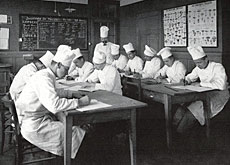The fine art of Swiss hospitality

The Lausanne Hotel School has been passing on its expertise to other countries eager to learn more about Swiss-style hospitality.
Particularly appreciated are the typically Swiss values of precision, quality and attention to detail.
The Hotel School, known by its French acronym EHL, is the oldest in the world. When it opened in 1893 it had just 24 pupils.
But such has been the explosion in the hospitality industry over the years – it now encompasses far more than just hotels – that the school now has more than 1,400 students from 87 countries.
The globalisation of the hotel and hospitality industry has long led to EHL graduates finding jobs around the world.
Working abroad is also a way for former students to gain valuable experience and of course, put their Swiss know-how to use. “This sense of precision and detail is still being passed on by the EHL today,” said Kallegeris Augoustinos, a Greek student at the school.
This expertise is also much in demand from other countries. “The school’s training programme has itself become a Swiss-made export service,” said André Mack, a senior consultant at EHL.
Coaching
“The EHL has been asked by governments, professional organisations and colleges from more than a dozen countries to provide a type of coaching while they set up their own hotel schools,” added Mack.
This includes Lebanon, which wants to bring its hotel business up to international standards. A Beirut university is cooperating with the Lausanne school.
Oman, which is experiencing a tourism boom, wants to attract more domestic staff.
“Until recently the Omanis were not trained in this type of service,” explained Betrand Willi, head of the EHL’s Alumni Centre. Previously such posts were normally held by internationally experienced professionals from India or the Philippines.
The lack of home-grown professionals is a problem that can be solved by setting up proper training colleges, which is where the EHL comes in. Added to this is the fact that the Gulf region is slowly coming to terms with the fact that its women could also work in the hotel business.
The EHL is also cooperating with the United Arab Emirates in its national training programme for hospitality.
Others less influential
EHL director Ruud Reuland says that other important tourism countries, such as Italy and Spain, do not appear to have such influential hotel schools.
“The tendency there is either theory-heavy universities or the totally practical start as a cook or skilled labour,” he said.
The Swiss way, says Reuland is to go to college where theory is combined with practice. This also happens in Finland and in the Netherlands.
Reuland added that the EHL was extending its training services to other sectors of the hospitality industry. This type of management is also in demand in hospitals, old people’s homes, prisons and asylum centres.
There are concerns that Swiss service values have become a bit watered down over the years.
“Whoever still wants to have a Swiss-made programme must still come to Switzerland and do their training here,” said Mack.
Those who want to have a training specific to their home countries should visit a local hotel college, he added.
swissinfo, Alexander Künzle
The Lausanne Hotel School was awarded the Jury special prize in 2003 from the Brand Excellence Swiss Trophy (B.E.S.T) for its work in enhancing the image of Switzerland abroad.
It is a member-institution of the University of Applied Sciences of Western Switzerland.
The school’s diploma is the equivalent of a university qualification and is recognised throughout Europe.
The Lausanne Hotel School was founded in 1893.
Around 25,000 people from 107 countries have graduated from the school.
There are currently 1,400 students from 85 countries.
It has 321 employees, of which 94 are teachers from 35 countries.
52% take the programme in English, 48% in French.
52% are women, 48% men.
44% come from Switzerland, a further third from Europe.

In compliance with the JTI standards
More: SWI swissinfo.ch certified by the Journalism Trust Initiative
You can find an overview of ongoing debates with our journalists here. Please join us!
If you want to start a conversation about a topic raised in this article or want to report factual errors, email us at english@swissinfo.ch.